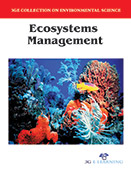Earth and Environmental Science

Biological resources serve the basis for life on Earth. The fundamental social, ethical, cultural and economic values of these resources have been known in religion, art, and literature from the earliest generations of recorded antiquity. Ecosystem management is managing capacities at various scales in such a way that ecological services and biological resources are conserved while appropriate human uses are sustained. Major ecological services include allocation of productivity energy flow, maintenance of soil fertility nutrient cycling, and operation of the hydrologic cycle. Biological resources encompass all natural variation found in genes, species, and communities along with the processes that maintain this variation.
However, in the past four decades, ecosystems have been sending ever louder distress signals. Many of the statistics are shocking: half of the world’s wetlands have been destroyed in the past century; some 27% of coral reefs have been lost and many more are imperiled by human activity; 80% of grasslands are suffering from soil degradation; 70% of the world’s dry lands are threatened by desertification; and groundwater is being depleted almost everywhere. Unless we manage these valuable assets wisely, we will jeopardize our own existence. Ecosystem management ensures that the flow of environmental, economic, and social goods and services is maintained. It also requires interventions ranging from strict protection through to control harvesting. Most of today’s environmental and human problems cannot be understood or addressed in isolation from each other.
This book entitled “Ecosystems Management” argues that a sustainable ecosystem management approach is vital to ensure the delivery of essential life support ecosystem services and must be mainstreamed into societal conscience, political thinking and economic processes. The book offers important insights and a unique perspective approach on ecosystem issues such as climate change, environmental degradation, increasing human population and demand for finite resources requires sustainable ecosystem management and equitable governance. Ecosystem degradation undermines food production and the availability of clean water, hence threatening human health, livelihoods and ultimately societal stability. Well managed ecosystems deliver many benefits to people. It is no exaggeration to say that they contribute significantly to food, water and income security, and climate resilience. Ultimately healthy ecosystems provide the basis for sustainable development and a functioning society. Yet despite the clearly demonstrated economic and social importance of biodiversity. This novel volume aims to discuss on the role of ecosystems in achieving food security, and to provide some direction and recommendations on how ecosystem management can contribute to the solutions we need for multiple problems.